Local SEO vs National SEO: What’s Different, What’s the Same, and How Do You Measure Them?
I remember when I was first confronted with a question related to local SEO vs national SEO. When I first started learning about search marketing, I asked a friend for help with a local business. She asked me, “well, are you thinking about On Page SEO (national SEO) or directories and Local SEO?”. I had no idea what she was talking about and it reinforced my belief that this whole world was a great big mystery designed to confuse me.
But I kept plugging away at all things SEO and the mysteries slowly started making sense. I hope this guide will clearly explain local SEO distinction for anyone else who is confused like I was.
What’s the difference between the two? Where do their results show up? How are they similar? What platforms do you use for each? How can you best measure performance for local seo vs national SEO? All that and more in this blog!
What is the Main Difference Between Local SEO vs National SEO?
At a high level, “traditional” SEO (also called national SEO or On Page SEO or onsite SEO) is geared towards improving the search visibility of your website on a national scale. Local SEO work, on the other hand, is all about increasing search visibility in a local market and primarily relies on platforms and listings other than your website.
With Local, it’s important to have NAP consistency and a reputation management approach in place. With national SEO, it’s all about creating valuable content (and optimizing it) and increasing domain authority. This National SEO work can involve everything from competitive research to content strategy to content creation to technical site improvements (site speed specifically) and digital PR. The most important priorities will hinge on business goals as well as the current state of the site. In general, Local SEO pricing tends to be lower than national SEO, because the scope of work can be more narrow.
But before we get to those concepts, let’s make sure we all understand where national SEO results and Local SEO results show up on the SERP.
Local SEO vs National SEO Results on the Google SERP
Thinking about national SEO vs Local SEO requires a clear understanding of the different results that show up on the Google SERP (Search Engine Results Page). While national SEO and Local SEO work together in many ways, some of the things we see on the SERP are there primarily due to the influence of one type (or the other) of SEO.
In the 90 second video below, you can see the influence of 3 different platforms on the SERP:
- The paid search ad at the top of the SERP comes our way courtesy of the Google Ads platform and is an example of an expanded text ad.
- In the middle of the page we see the “Local Pack” or the “Local 3 Pack”, which comes our way courtesy of Google My Business (GMB). In our view, GMB is the single most important platform for Local SEO and is critical for all businesses with a physical footprint. But more on that later in this article.
- Towards the bottom of the SERP is the #1 organic (On Page) SEO result. Instead of coming from a platform like Google My Business, these search results are most related to the structure and content on the website itself. Whether it’s WordPress, Squarespace, or some other CMS, the content on the domain is directly influencing what shows up on the SERP.
Now that we know what’s what on the SERP, let’s talk about 2 big concepts that help Local SEO results show up there.
Local SEO Big Ideas: NAP and Reputation Management
Consistent NAP citations and a reputation management plan are important parts of a holistic Local SEO approach.
What Do NAP Citations Mean for Local SEO?
NAP is an acronym for Name, Address, Phone. Search engines have higher confidence in businesses with consistent listings across the 60+ directories that are out there. If all platforms are telling Google the same thing in terms of say, your phone number, Google is going to feel great about showing your business to someone searching for the specific service your business provides.
About 46% of all searches on Google today have local intent, and nearly half of those searches involve a visit to a physical location in the next 24 hour period. When visit intent is so high, it’s easy to understand why there is such a premium on accurate contact information.

nope, not that kind of NAP
Conversely, if Bing Places has an outdated address, Yelp has an old phone number, and the name on Facebook is a different variation than the others, search engines will be more wary about showing your business. And a wary search engine is a search engine that won’t prioritize your business on the SERP.
In addition to Name, Address, and Phone, other important elements are the website’s URL, the business Hours, and the Category of the business. Consistency equates to search engine confidence and ramped up local search visibility. Interested in how your business is looking? You can check your NAP consistency with a free business listing scan.
What Does Reputation Management Mean For Local SEO?
Reputation management refers to the process of monitoring, managing, and generating reviews on the various business directory listings. The most important is the Google Business Profile (formerly called Google My Business), while Facebook, Yelp, and others are still worthwhile. Reviews matter.
Reviews matter for customer experience. According to reputation management company BirdEye, a single negative review can cost a business up to 30 potential future customers. Why? Because potential customers will often read through reviews before choosing a new business, and they will often filter to see the negative reviews.

Reviews also matter for local search visibility. While Google doesn’t reveal exactly how this factors into local search visibility, 91% of local marketers agree that they see an impact based on reviews. From our own research, we have seen a massive change in Local visibility based on whether a business sits above or below a 4.0 average rating in Google. There seems to be a similar magic line that exists at the 4.5 rating, with businesses at 4.5 or above getting significant priority over 4.4.
The good news is that up to a third of all reviewers would be willing to change a negative review to a neutral or positive review if they received a professional and empathetic response from the business. The bad news is that nearly 6 in 10 local businesses still do not have a reputation management strategy in place.
The Importance of the Google Business Profile
The good news is that up to a third of all reviewers would be willing to change a negative review to a neutral or positive review if they received a professional and empathetic response from the business. The bad news is that nearly 6 in 10 local businesses still do not have a reputation management strategy in place.
National SEO Big Ideas: Optimizing Quality Content and Increasing Domain Authority
With national (On Page) SEO, the name of the game is creating and optimizing quality content that is useful for humans and understandable for search engines. With great content as the backbone, a website can attract inbound links over time that will increase domain authority.
What Does Content Have to Do With National SEO?
In a word: everything. In fact, the discipline of SEO is less about “doing” SEO and more about creating amazing content that adds value for people. While it’s possible to get shorter pieces of content to rank on the SERP (say 400 – 600 words), the top performing pieces of content are 1,500 – 2,000 words and up.
But the goal isn’t to create lots of words (filler content will hurt, not help), but to create and share in-depth, valuable information that helps users to answer questions and solve problems.

And then that amazing content must be optimized so search engines can understand it. Here’s what Google says about SEO:
You should build a website to benefit your users, and any optimization should be geared toward making the user experience better. One of those users is a search engine, which helps other users discover your content. Search Engine Optimization is about helping search engines understand and present content.
On Page content optimization means thinking about things like title tags, meta descriptions, H1s vs. H2s, keyword density, internal linking, and more. If those concepts are unfamiliar, here is a refresher on SEO writing.
What Does Domain Authority Mean and Have Do I Get an Authoritative Domain?
Domain authority (or DA) is a metric developed by Moz that predicts how likely a website is to rank on the SERP. Domain authority scores range from 0 to 100 with the most authoritative sites having the highest authority.
The concept is based on the idea that websites are not all created equal in the eyes of search engines. For example, Google will place a 2,000 word article from the New York times relatively high on the SERP. If that same article had been published on a brand new site with low readership, the article would not show up as high.
So what drives Domain Authority? It’s all about links! Links are the popularity votes of the internet. The more links a website has, the more votes of “trust” it has. So when content shows up on a trusted site with high DA, it has an instant leg up on other content in terms of ranking potential.
And how do you get links? The best way is to create amazing content. Amazing content is the kind of content that other webmasters will want to link to, because it adds value for their readers. For example, here’s a link to a Moz article on domain authority, that is highly relevant to this blog. I’m happy to link to it because it may be useful for someone reading this blog. Moz is happy to receive the link, because it continues to boost the authority of the linked page and the domain overall.
What is the Same Between National SEO and Local SEO?
For all their differences, national SEO and local SEO have similarities as well. Chief among them is that search engines want to deliver the best possible user experience, and that means looking for quality. The last thing that Google wants to do is send a user to a mediocre website (or coffeeshop) and give that user a reason to use Bing or Yahoo or Yelp in the future.
So it’s worthwhile to think about what search engine bots are actually up to when they are crawling the internet: they are on the hunt for signals representing high quality content (for national SEO) and listings (for Local), so they can deliver a positive user experience.

In the case of Local SEO, relevant and authoritative results are measured primarily by signals like average rating, geographic proximity, photos, and regularly updated business hours. The emphasis is less on the density of the actual verbiage, so authority and relevance are measured by those other signals. After all, a top ranking piece of On Page SEO content on the SERP might have 2,000 words, while a Google Business listing description only allows 750 characters!
In the case of national SEO, most of that content is best presented using in depth copy on a website. It’s critical to know about on page optimization best practices to help search engines understand the page.
High quality content that is helpful, authoritative, informative, and unique is absolutely necessary to ranking. The better the content is evaluated across those dimensions of quality, the higher it will show up on the SERP (search engine results page).
What are the Most Important Platforms to Use for National SEO and Local SEO?
Branded search is high intent and more likely to convert than non-branded search. In other words, these prospects have pretty much made up their made that company X is the right provider of the service, product (or latte) that they are looking for, and they are more likely to be in a conversion phase rather than a research phase. In terms of thinking about the value of organic traffic to an organization, organic search is valuable viewed through this lens. However, SEO isn’t really winning new eyeballs for the company in this way. After all, these people were already thinking about the company. In this view, branded organic traffic can be though
National SEO Platforms
These are five platforms related to On Page SEO / national SEO that we use every day.
- Moz Pro SEO: Moz is a paid SEO software platform. It’s great for keyword research, SEO campaign tracking, competitive research, and more. It also helps with technical SEO site crawls and is a great tool for analyzing individual pages for optimization efforts. There are a number of SEO platforms out there. We experimented with both SEMRush and Moz, and ultimately landed on the latter for ease of use. Although if you’re doing market research the free Market Explorer tool from Semrush is incredible. Here’s a video tutorial of how to use it if you’re interested.

- Google Analytics: Google Analytics is the single source of truth for all of our digital marketing efforts. Moz is great for understanding how keyword ranks move as a result of On Page SEO efforts, but GA takes that further by showing how it translates into traffic and website conversion activity coming from organic search. Simply put, GA is a must have for measuring the actual ROI of any On Page SEO effort.

- Google Search Console: Formerly known as Google Webmaster Tools, Google Search Console is the place to go for organic search insights directly from the big Google machine. Unlike Google Analytics, which measures all web activity on a given web property, GSC will only reveal traffic and keyword insights for Google organic search. But the depth and value of those insights is amazing. With Search Console, you can see how individual landing pages are performing in terms of organic traffic trends, and what keywords are getting impressions and clicks for those pages. You can also see where those keywords are ranking and how branded vs. non brand organic search is trending. Plus, you can perform other important site actions like submitting your sitemap to Google and reviewing inbound links coming to your domain from other sites.

- Your CMS (Content Management System) like WordPress: It should go without saying that any On Page SEO effort requires access to optimize the content on that website. But I’ll go ahead and say it anyway: any kind of On Page SEO work will requires access to the content on that website. That’s where your CMS comes into play. You’ll need to know how to use it to implement your onsite content optimizations.

- Google Tag Manager: Like Google Analytics,. Google Tag Manager (GTM) is an important platform to measure the effectiveness of your SEO efforts. Are those organic clicks on your blog posts leading to conversions on the site like clicks to call and whitepaper downloads and submitted forms? Much of that activity requires setting up button click tracking and other events in Google Tag Manager that then get passed along into Google Analytics. GTM is a free platform. While it can take a long time to master, getting started can be done in the 5 steps outlined here in this Tag Manager start up guide.

Local SEO Platforms
Here are a few Local SEO tools that we use day in and day out.
- Google My Business (now called the Google Business Profile in 2022): Google My Business in the single most important platform for Local SEO, making it one of the most important platforms for SEO overall. And that importance is growing, according to the Local Search Ranking Factors study. The top 15 factors for making it in the Local Pack from the most recent version of the survey are below. And for those just getting started with GMB, here is a free guide to Google My Business.
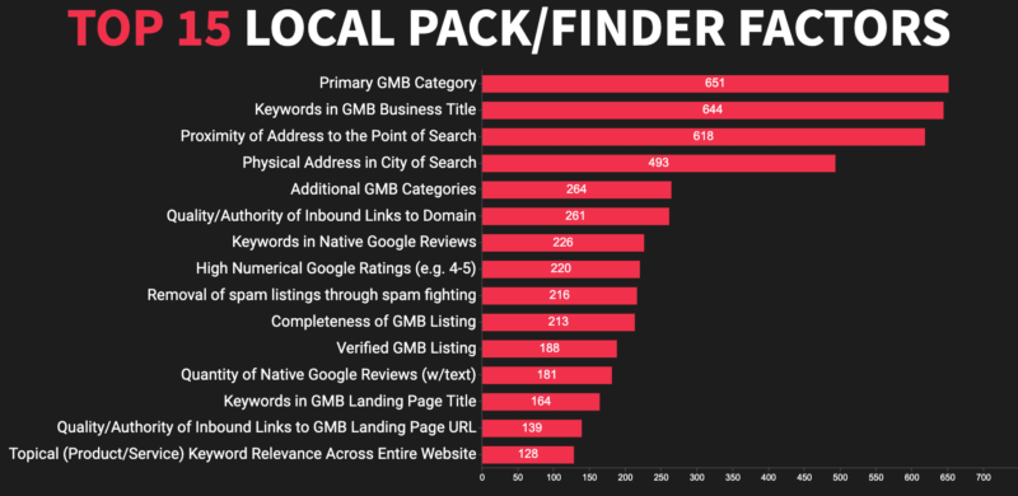
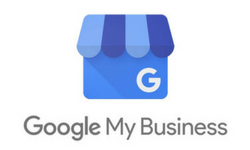
- Yelp: Yelp is like a less important Google business listing. Like GMB, you want to create an accurate, comprehensive business listing replete with detailed information, relevant business categories and keywords, and good photos. Reviews matter here as well, so it’s important to have a reputation management plan in place.

- Yext: All directory listings are not created equal. After Google My Business (far and away the most important), and some secondary listings like Yext, we don’t see a ton of value in managing the others individually. That’s where Yext comes in. We use Yext as our directory listing platform, which helps to ensure consistent and accurate information across 60+ other directories like Bing Places, City Pages, Yellow Pages, and more. With Yext, we’re able to fill out the information for a business location in a single place, and then sync that information across a wide network. This saves time by consolidating access in a single place, and boosts Local SEO by making it easy to get NAP consistency in those listings.

How Do You Measure Both Local SEO and National SEO?
Having measurement plans and protocols in place is important for evaluating both national and local SEO efforts. Here are three ways for each to help you understand performance.
How to Measure Local SEO?
Here are 3 tips for measuring Local SEO performance. The first two are specific to Google My Business and the third is specific to Yext.
- Add UTM parameters to your website links in your Google business listing so you can isolate that traffic within Google Analytics. Your parameters for source and medium should still be google and organic so that traffic will roll up in Organic search traffic channel, but add a campaign like utm_campaign=gmb_locationname so you can see this traffic in the Campaign reporting section of GA. Here’s an example of what that looks like below. Or, check out this step by step guide to add UTM tags to Google My Business.

- Record your Google My Business insights data each month so you can measure performance on a month over month and year over year basis. It’s especially helpful to measure Discovery vs. Direct search visibility (ideally driving a greater share of the former over time), as well as calls, direction requests, clicks to the website, and photo views. Here’s an example of the Customer Actions reports, where we can see activity taking place on the listing like direction requests and calls.

- If you’re using a platform like Yext or Synup to help manage directory listings, use the built in reporting tools to help quantity and measure user activity over time. As you can see below, with Yext you are able to measure specific conversion actions like Mobile Clicks to Call, Driving Direction Requests, Order Now buttons, and even requests to ride with Uber.

How to Measure National SEO Performance?
With national SEO, we want to measure our keyword ranks, our overall traffic from Organic Search, and our conversions from Organic Search. Let’s start with keyword rank tracking.
- Identify the most important search themes for your business and track your ranking for individual keywords using a platform like Moz or SEMRush. Here’s an example showing the national keyword ranks for target keywords related to our button click tracking blog. This allows you to see how specific optimization efforts translate into real estate positioning on the SERP, which ultimately translates into increased click volume and more web conversions from organic search.

- Use Google Analytics to regularly measure your web traffic coming from Organic Search. If you’re investing (either time or money or both) in On Page SEO, you should eventually see that translate into more organic traffic coming to your site. Using the Acquisition reports in GA is a great way to see if your efforts are paying off.

- Create a custom segment in Google Analytics to help measure how Organic Search is driving key conversion actions. Ultimately, you will want to understand if increasing keywords ranks and getting more organic traffic is also driving more conversion activity. For that, you’ll need to set up proper Goal Tracking in your Google Analytics view. Once you have those goals properly configured, you can set up a custom segment to isolate Organic Traffic and see exactly what your SEO efforts are creating. Here’s an example where we can see that Organic Traffic drove 128 out of 195 new newsletter subscribers in a 14 day period. Not bad!

Two Types of SEO In Summary
When we’re thinking about local SEO vs national SEO, it’s important to remember that search engines are always looking to serve high quality results to users on the SERP.
In the case of Local SEO, the key ranking criteria will be things like listing consistency, review quantity and quality, regular listing updates from the business owner (review responses, hour updates, and more), high quality photos, and the location of the user relative to the listing location. For national SEO, a high quality result will be primarily predicated based on the expertise, authority, and trust of the corresponding content.
For Local, think about NAP consistency and driving lots of great reviews.
For On Page, think about generating in-depth, unique content that will be helpful for people. And then optimize that content for search engines.
And whether it’s Local SEO or national, remember to have a measurement plan so you can evaluate performance over time.
If you’re interested in more digital marketing training, check out the Root and Branch YouTube channel. Have fun out there and happy optimizing!
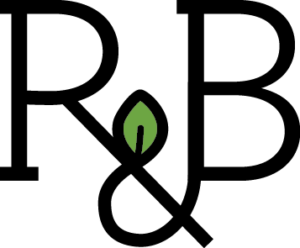
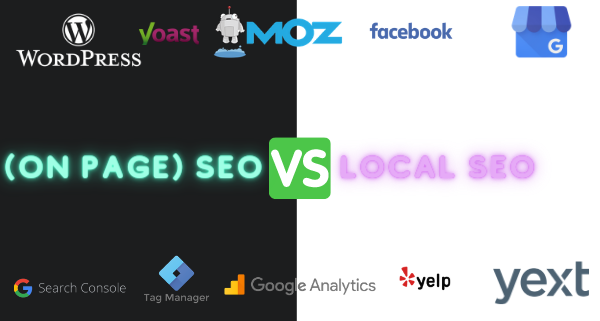






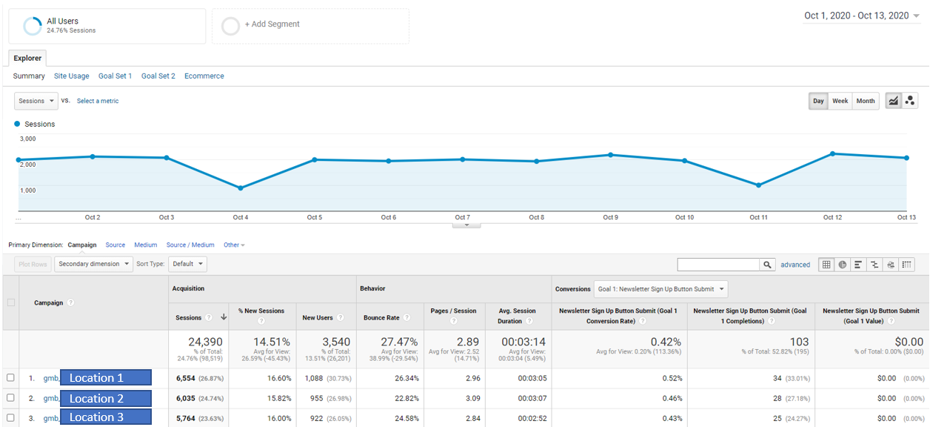
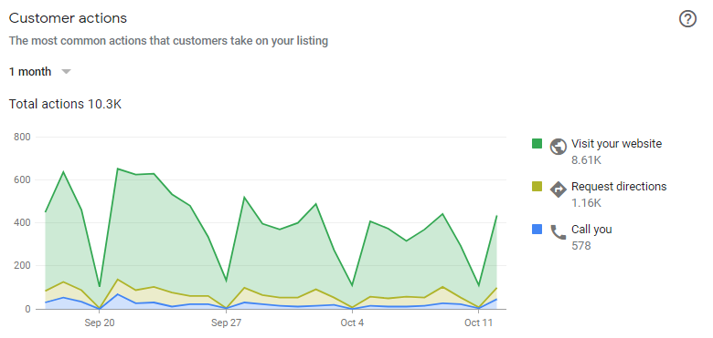
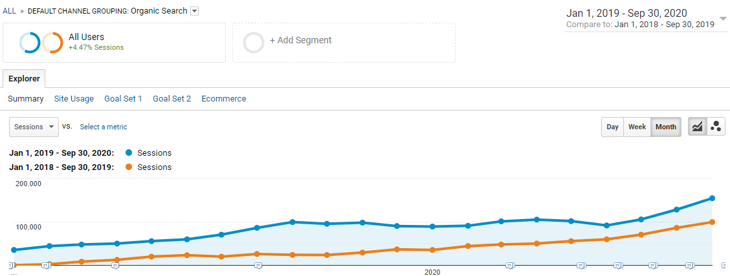
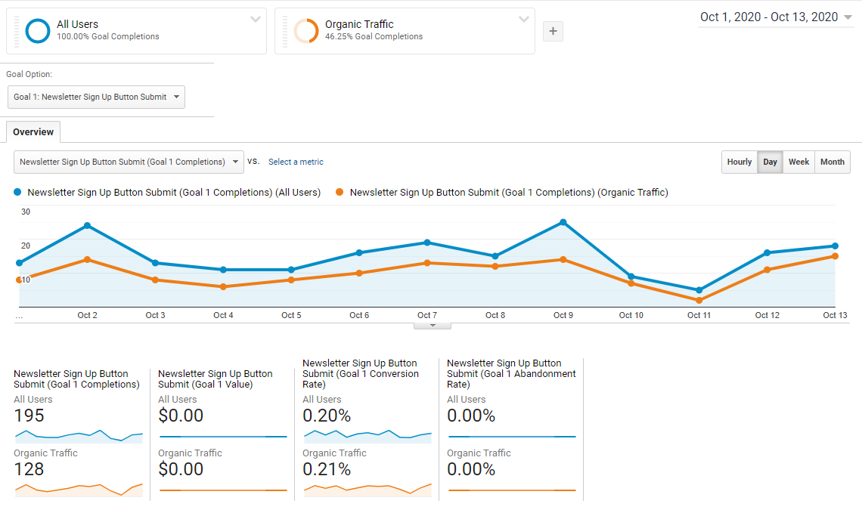



Nice post with complete information about local seo
Thanks for the feedback. Glad you came by to give it a read. If you’re looking for more Local SEO info, you might want to check out this 3.5 minute YouTube video I made on tracking leads from the Google Business listing. Cheers!
Organic (general) results definitely affect local ranking. It is a significant factor in local listing and almost as important as exact geolocation of listing
Fair point, Steve. It’s a interconnected ecosystem in terms of what Google is looking for to rank on the SERP. But in terms of things that are exclusive to Local SEO (not On Page), citations (NAP consistency) and Review signals are the big deals.